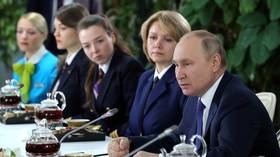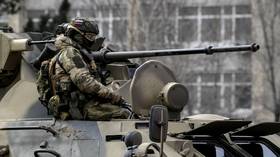Putin defends rationale for Ukraine offensive

Sending Russian forces to Ukraine was “a difficult decision, without a doubt,” Russian President Vladimir Putin said on Saturday, before going on to relate the chain of events that, in his opinion, had made the attack unavoidable.
The offensive was launched on February 24 on Putin’s orders. The majority of Western countries ruled it “unjustifiable” and “unlawful,” and have since imposed tough sanctions on Russia.
“I said this at the beginning of the operation, and I was talking about it before this decision was made. A difficult decision, without any doubt,” the president opined, addressing female airline representatives at an event on Saturday.
He explained that the situation in Ukraine had spiraled out of control following what he called 2014’s “unconstitutional coup,” which he said had been actively backed by the West. “They aren’t hiding this, and openly said they’d spent $5 billion on it,” he asserted.
But the regime change was rejected by some parts of Ukraine. And, while Crimea reunited with Russia through a referendum, the dissidents in the southeastern Donetsk and Lugansk regions had subsequently “faced persecution,” Putin claimed.
The Kiev government had staged large-scale military operations in the Donbass, he reminded his listeners. After they failed, the Minsk agreements had been signed by both parties, setting out a roadmap to a peaceful exit from the conflict.
According to Putin, Moscow had tried to do all it could to maintain the territorial integrity of Ukraine and, at the same time, protect the interests of the people of Donetsk and Lugansk, but Kiev had blockaded the Donbass, oppressed its people, and shelled the Donbass, he said.
“Listen, people in the Donbass are not stray dogs. Between 13,000 and 14,000 people have been killed over the years. More than 500 children have been killed or crippled. And what’s especially intolerable is that the so-called ‘civilized’ West preferred not to notice it during those eight years,” Putin said.
The president listed several other issues he said had been deeply concerning for Russia, including the lack of guarantees that Ukraine would not be admitted to NATO. He had cited the same reasons on February 24, before launching what the Kremlin termed a “special military operation” against Kiev.
The West has remained unconvinced by these arguments, however, and has responded with harsh sanctions against Moscow, some nations imposing restrictions on Putin personally.













